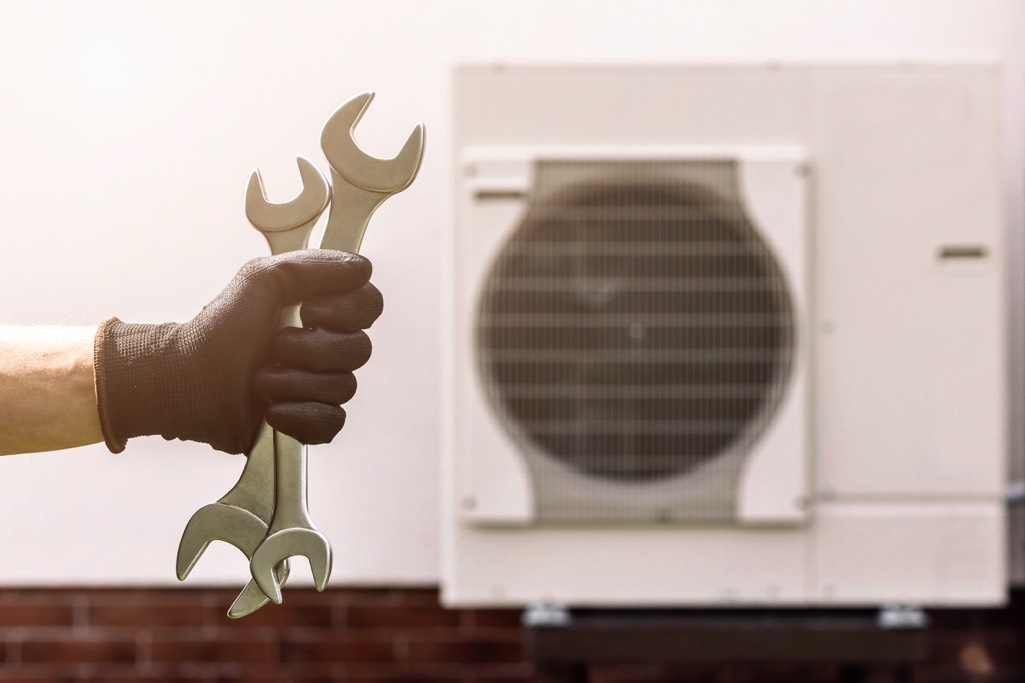How long does a heat pump last?
An air source heat pump should last around 15-20 years – 5 to 10 years longer than a gas boiler. A ground source heat pump can last up to 25 years. Regular maintenance is essential to improve the lifespan of your heat pump and keep it running efficiently.
What is a heat pump?
Heat pumps take heat from outside your home and redistribute it inside. Air source heat pumps take heat from the outside air, while ground source heat pumps take the heat from the ground. Air-source heat pumps are the most common type of heat pump in the UK.
Heat pumps are much more efficient that traditional heating systems. A typical air source heat pump will produce 3 x as much energy as it consumes. Gas furnaces (natural gas boilers) produce less energy than they consume.
Air source heat pumps come in two flavours – air to air and air to water. Air to air systems heat your home by blowing warm air into it. They are great for open plan homes with larger rooms. Some systems are able to go into reverse and blow cold air in the summer months – like an air conditioner. We call this an HVAC system – which stands for heating, ventilation and air conditioning.
The main drawback of air to air systems is that they are unable to heat your hot water. You will need separate solution to do that (such as a natural gas or electric boiler). Air to water systems on the other hand use the heat gathered from outside your home to heat water inside. This water is then used to heat your home through radiators or underfloor heating – as well as for showers, cooking etc.
The great advantage of this type of heat pump system is that it can replace a traditional gas boiler. For this reason they are the most popular type of system in the UK.
The average lifespan of a heat pump
The good news is that heat pumps have a much longer lifespan than traditional gas boilers. In general they are well solidly built machines which are designed to last a long time.
While the lifespan of a gas boiler is around 10-15 years, the average life expectancy of a heat pump can be double that. Air source heat pumps tend to last around 15-20 years. Ground source heat pumps have an even longer lifespan and can easily last 25 years.
How to extend the life of a heat pump
There are a number of things you can do to make your system last as long as possible. Some of these tasks you can perform yourself, and some will require the services of HVAC experts.
Let’s take a look in a bit more detail…
Regular maintenance is important
One of the keys to increase the life of your heat pump is regular maintenance. Not only will a well-maintained system last a long time. But it will also be more efficient over the heat pump’s lifespan. The best maintained heat pump will use 25% less energy than one without proper care (according to heat pump experts).
Householders are able to perform certain maintenance tasks themselves to keep their systems running effectively. For example, it is very important to make sure the outdoor unit has enough space around it and nothing is obstructing the air intake. This is especially important in the winter months when falling leaves can block it.
You should also make sure you change or clean the air filter regularly. This is normally every month or two. Check the manufacturer’s recommendation on how often you need to do this.
Get regular maintenance services
While there are some tasks you can do by yourself, it is imperative to have a proper maintenance session performed by a certified HVAC technician at least once a year. Professional heat pump maintenance is not a DIY job and will require the services of a reputable HVAC company.
Your installer should be able to help with this. You can also check out our article on how to find a good installer.
Make sure your system is not oversized or undersized
Along with a lack of maintenance, having HVAC equipment that is too powerful, or not powerful enough for your home, can reduce its lifespan.
You might think that installing a very powerful heat pump will keep your house nice and toasty. However the system will be forced to start and stop more often which risks burning out the motor, or the compressor. Similarly, if your heat pump is underpowered for your home, the system is likely to be running at maximum for longer than it is designed for. This means that parts are likely to fail before they should.
When you install your new heat pump make sure that your HVAC engineer does a full heating survey and specifies the correct model for your house and your heating requirements. Check out our article on heat pump installation for more on this.
How to tell if your heat pump needs replacing
All machines will come to the end of their useful lifespan at some point. If you have an older system which is doing any of the following, it might be time to replace it:
1) Your system requires frequent repairs and gets more and more expensive to fix.
If you’re having to spend a lot of time and money to keep your heat pump running then it might be on its last legs. At some point the labor costs to fix expensive repairs will work out dearer than replacing it for a new system.
2) Your energy bills are increasing for no obvious reason
As a heat pump ages, it will become less efficient at transferring heat from outside your home to inside. You will find that the pump is having to run longer to reach comfortable temperatures.
Your utility bills will naturally increase in colder weather, with higher energy usage, or if your energy costs change. But if you find that your bills are increasing for no obvious reason this could be a sign that your pump is not working as effectively as it was.
3) You have an air to water pump and your hot water is not as hot as before
For the same reasons as number 2 above, the energy efficiency of a machine will reduce over time. At the end of a heat pump’s life expectancy the water will not get as hot. If you notice that the water in your cylinder is cooler than before, you might want to think about a heat pump replacement.
How long should a heat pump last, in summary
Heat pumps are not only a great solution for homeowners looking to reduce their reliance on fossil fuels. They are also the best option for those looking for a low maintenance type of heating system. In some parts of Europe they are by far the dominant heating system installed in residential buildings.
With proper installation, and regular maintenance your system should give you years of service trouble free. They offer great peace of mind for homeowners.
Are you thinking about installing a heat pump in your property? We have lots of information to help you make an informed decision. Find out if your house is suitable, or find out how much an air source or ground source heat pump is likely to cost. We also have lots of information about the various government grants available as well as a full guide to air source and ground source heat pump installation.

